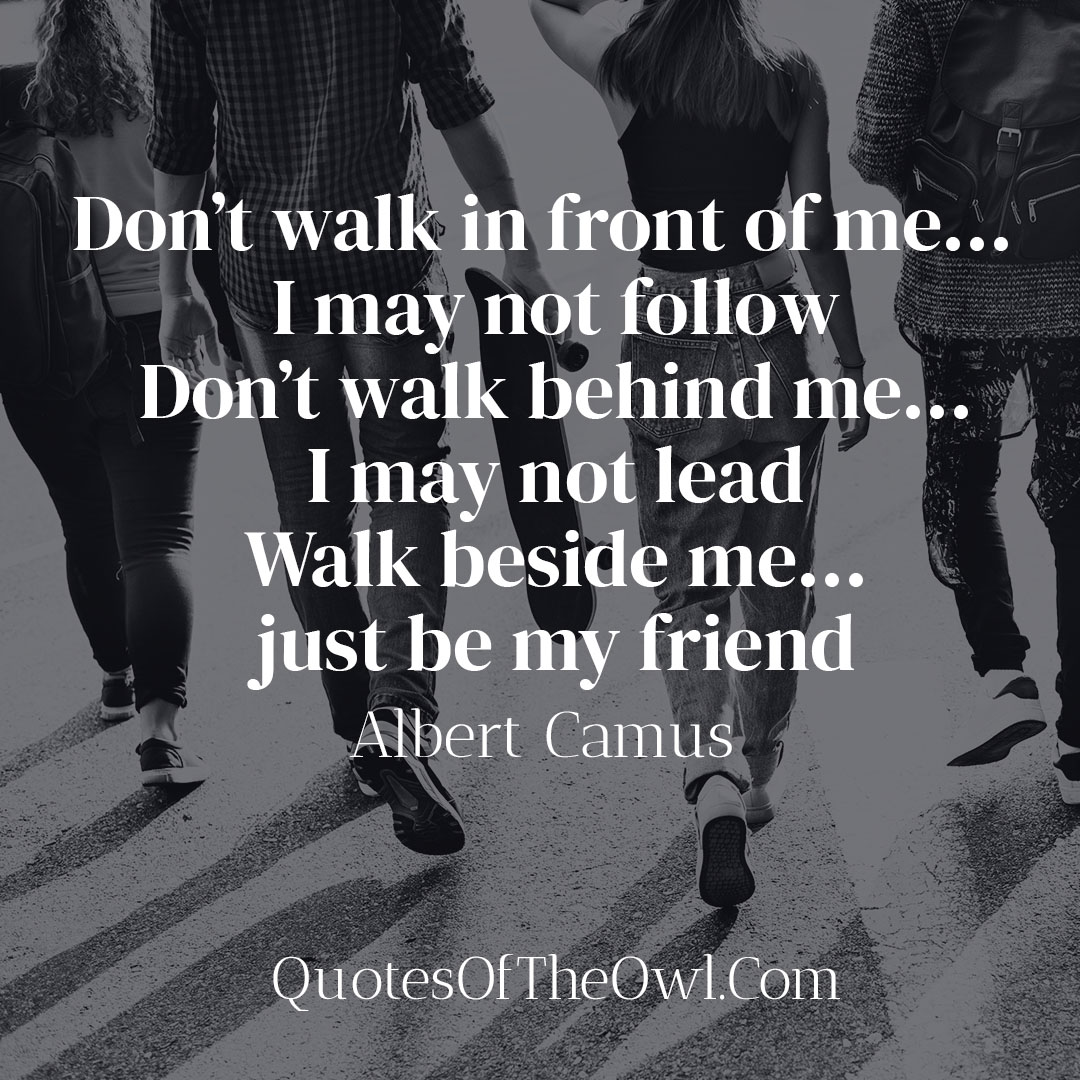Uncover the wisdom behind Albert Camus’ iconic quote “Don’t walk in front of me… I may not follow. Don’t walk behind me… I may not lead. Walk beside me… just be my friend.”
As one of the most celebrated French philosophers and writers of the 20th century, Albert Camus left behind a legacy of thought-provoking works that continue to inspire readers across the globe. His iconic quote “Don’t walk in front of me… I may not follow. Don’t walk behind me… I may not lead. Walk beside me… just be my friend.” has been quoted countless times, but what does it really mean? In this article, we will delve into the wisdom behind Camus’ words and explore the deeper meaning of his philosophy.
The Origin of the Quote
The famous quote “Don’t walk in front of me… I may not follow. Don’t walk behind me… I may not lead. Walk beside me… just be my friend.” is often attributed to Albert Camus, although there is no conclusive evidence that he ever said or wrote these words. However, the quote is in line with Camus’ philosophy of individual freedom, equality, and the importance of friendship in human relationships. It has been widely circulated and quoted by individuals who resonate with its message.
The Importance of Equality in Relationships
One of the key messages behind Camus’ quote is the importance of equality in human relationships. By suggesting that we should “walk beside” each other, rather than in front or behind, Camus highlights the need for mutual respect and equal treatment. This message is particularly relevant in a world where power dynamics often create inequality in relationships, such as in the workplace or in personal relationships. Camus believed that true friendship could only exist between equals, and this quote encapsulates that belief.
The Need for Individual Freedom
Another important theme in Camus’ philosophy is the need for individual freedom. By suggesting that he may not follow or lead, Camus highlights the importance of personal autonomy and the freedom to make our own decisions. This message is particularly relevant in a world where individuals are often pressured to conform to societal norms or follow the lead of others. Camus believed that true freedom could only be achieved when individuals were able to make their own choices, free from external pressures.
The Power of Friendship
Friendship is a powerful force that has the ability to transform our lives in countless ways. It provides us with a sense of belonging, support, and companionship that helps us navigate the ups and downs of life. When we have friends, we are able to share our joys and sorrows, celebrate our accomplishments, and receive comfort and guidance during difficult times. Studies have also shown that having strong friendships can lead to better physical and mental health, increased happiness and life satisfaction, and a longer lifespan. Overall, the power of friendship should not be underestimated, as it has the ability to enrich our lives in immeasurable ways.
The Role of Ethics in Human Relationships
Camus’ philosophy was also deeply rooted in ethics and the importance of living a meaningful life. His quote suggests that the most important thing in life is not to lead or follow, but to walk beside each other in a way that is ethical and just. For Camus, this meant living a life of integrity, authenticity, and personal responsibility. He believed that the meaning of life was not something that could be found in external sources, but rather something that was created through our own actions and choices.
The Impact of Camus’ Philosophy Today
Although Camus’ quote was originally intended to convey the importance of friendship, equality, and individual freedom, its message has resonated with individuals across different generations and contexts. Today, it is often quoted in the context of leadership, teamwork, and collaboration, as well as in discussions about ethics, personal responsibility, and the importance of living a meaningful life.
The Relevance of the Quote in Contemporary Times
The message of Camus’ quote is particularly relevant in contemporary times, where individuals are often pressured to conform to societal norms and expectations. The quote encourages us to resist these pressures and to make our own choices, free from external influences. Additionally, the message of equality and the importance of genuine human connections is more important than ever in a world where technology has made us more disconnected from each other than ever before.
Common Misinterpretations of the Quote
Although Camus’ quote is often quoted and cited, it is also subject to misinterpretation. For example, some individuals interpret the quote to mean that it is better to follow than to lead, or that leadership is not important. However, Camus’ message is not about the importance of leadership, but rather about the importance of mutual respect and the need for equal treatment in human relationships.
Conclusion
Albert Camus’ iconic quote “Don’t walk in front of me… I may not follow. Don’t walk behind me… I may not lead. Walk beside me… just be my friend.” continues to inspire individuals across the globe. Its message of friendship, equality, individual freedom, and ethics has resonated with individuals from different generations and contexts, and its relevance in contemporary times is more important than ever.
Book Recommendations

